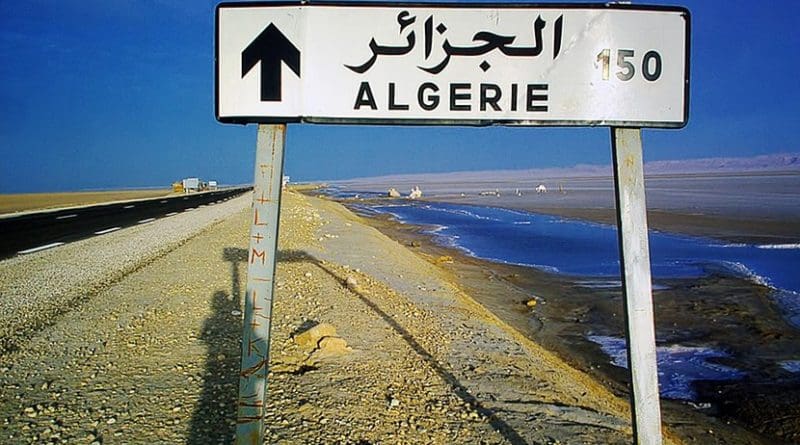Has The Algerian Revolution Reached An Impasse? – OpEd
Abdelaziz Bouteflika announced his candidacy for a fifth presidential term according to that Algerian protests began on 16 February 2019. These protests, without precedent since Algerian Civil War, started on February 21 the next day, the portrait of the President was torn down from the landmark central and the post office. Human rights activists said that up to 800,000 demonstrators. A diplomatic source estimated that as many as 70,000 people had massed in Algiers, including a rally at Bab Ezzouar university.
On 24 February 2019, regularly hospitalized for “periodic medical examinations”, Abdelaziz Bouteflika was admitted to the University Hospital of Geneva (Switzerland). On 8 March a call to protest hundreds of protesters marched peacefully, calling his candidacy a “provocation”, an “insult” and a “masquerade”. The next day, many students boycotted their classes. Protesters held signs reading: “Dictatorship means shutting your mouth. Democracy means always talking.”
Crowds gathered in Algiers throughout the morning despite train services being stopped by authorities, and huge numbers demonstrated in every other major city and most towns. Most of those involved are young but they have received support from journalists, lawyers, unions and the influential association of veterans of the war of independence against the French between 1954 and 1962.
The protests were the biggest in a series staged almost daily since a huge rally on 22 February, so far all have been without violence. Moreover, Social media pages told marchers to come equipped only with “love, faith, Algerian flags and roses”.
There is widespread resentment in Algeria at the incompetence and corruption of the Front de Liberation Nationale (FLN), the party that has been in power for more than 50 years. Several FLN parliamentarians resigned to join the protest movement.
Andrew Lebovich, an analyst at the European Council on Foreign Relations, said: “The protests can’t be ignored forever, and I think the situation would be really very difficult.”
Politics in Algeria are notoriously opaque, but analysts say there may be divisions among the top FLN officials, spies, businesspeople and Bouteflika’s inner circle who collectively constitute the ruling elite.
Algerian president he will not run again
Bouteflika made the surprise announcement on Monday 11 March a letter to the Algerian people from his office. that he will not run again I am 82-year-old leader, I has been in power for two decades.
The new elections scheduled for April to allow for consultation on reforms “for a new generation”. The country was living through a sensitive stage of its history. On this, at least he and his compatriots agreed.
Bouteflika said in the letter, praising the peaceful nature of the protests before promising sweeping constitutional and political changes. and “This new system and new republic will be in the hands of a new generation of Algerians,” he said, promising a national conference lasting until the end of this year to find his successor.
This national conference under the direction of an independent presidential commission. “This will independently decide the date of the presidential election, in which I will not be a candidate in any instance,” he said. The conference will be accompanied by a national referendum to rewrite the constitution. In the meantime, Algeria will be governed by an interim government to oversee the country’s day-to-day institutional function.
The conference will lead to a “transformation of our nation state”, and fix the date of the next polls, the Algerian president said.
On the other hand, Bouteflika he wants to protect the country not to be like Syria but the opposition party is afraid that the regime will renewing itself like what happened in Egypt, Tunisia and Yemen they depend on Article 102 of Algeria’s constitution that allows the constitutional council to declare the presidency vacant if the incumbent is too ill to exercise his functions, then we will ask the parliament to declare him unfit. After that the leader of the upper house would then take over in a caretaker capacity for 45 days.
As we know it is the same situation as what happened in Egypt, that the military junta intervenes and declared in elections that the former regime managed to govern again.
Based on this, the army chief want to take the role to control the citizens by speech’s “This solution achieves consensus and must be accepted by all,”. On the other hand, The army chief is one of Algeria’s top power-brokers.
furthermore, opposition parties and civil society aimed to reforming the country’s constitution, but it will not solve the problem. “What we need is an elected president,” according to that situation hundreds of students were protesting again every day. They said “Algerian leaders think we will give up … Of course, not”. “We hope everyone in Algeria can defend to death”.
“Algeria is free” … “We do not want a dominant Arab dictatorial regime” … “Democracy to the people” … “We will be back here every day until they all leave’.
*Miral AlAshry, Associate Professor at Future University (FUE), Political Mass Media Department

